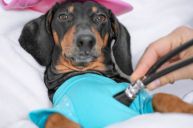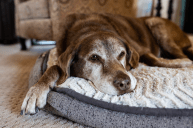A veterinarian is warning against one common habit that you may let your dog do. Many pet owners see it as a sign of affection, but it can also be risky.
You shouldn't let your dog lick you in the face. This comes after a 26-year-old pregnant woman found that she also had a hydatid cyst in her pelvis caused by a tapeworm. Humans commonly contract the parasite from dog poop. A case study believes that the the woman letting her dog lick her in the face may have caused her to contract the tapeworm.
"Ideally, dogs should not lick faces, especially around the mouth or eyes, as a matter of health," Dr. Aimee Warner, a resident veterinarian at pet insurance company Waggel, told the Daily Mail. "Humans are not infected by the adult tapeworms within the dog, but instead ingest Echinococcus eggs passed in dog feces by accident. If a dog has fecal soiling on its mouth or coat and then licks someone, there is a potential — albeit rare — for transmission."
Dog Licking
The vet also recommends keeping your dog away from livestock and also keeping them well groomed. "Good pet ownership can be the difference in preventing risks," she said.
She's not the only vet telling you to not let your dog lick you in the face.
"Also, avoid face licks from dogs that have a tendency to eat their own or another animal's poop," Judy Korman, DVM, veterinary consultant with formula company MYOS Pet, told Newsweek. "Germs, whose route of transmission is oral to fecal (e.g. some intestinal parasites, bacteria and viruses), can uncommonly be transferred from dogs to humans if the dog has recently ingested these germs by eating infected animal feces and subsequently licks your mouth."
But what of the saying that a dog's mouth is cleaner than a human's? Just a myth.
"Like many myths, it is unclear how the myth that dogs have cleaner mouths than humans got started or took hold," Korman told Newsweek, "Perhaps it started with the observation that a dog's saliva must have healing properties since dogs typically lick their cuts and wounds, attempting to heal them."
"The pH of a dog's mouth is less acidic than that of their human counterparts. This reduces the risk of cavities, but does not lower the risk of them getting periodontal disease, which is also caused by bacteria," Korman also said.




